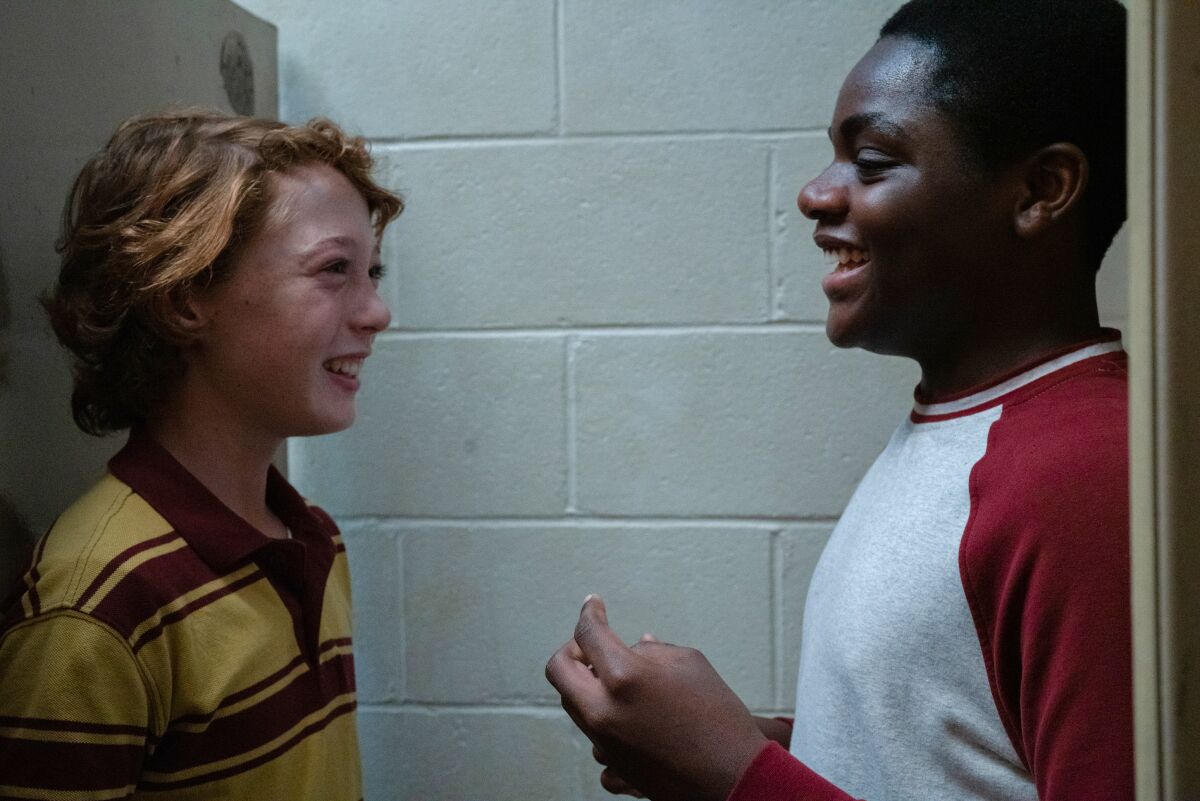
The 1980s was a pivotal decade that saw many great changes for the United States. An actor became President, a child star went solo and changed music and television forever, and commerce coined a phrase that would last for decades “Greed is good.” Some of the changes were good, some bad, but it is undeniable how substantial they were. The latest film from director James Gray explores this crossroads.
Armageddon Time follows the Graffs, a middle class Jewish family living in Queens led by Esther (Anne Hathaway) and Irving (Jeremy Strong) with sons Ted (Ryan Sell) and Paul (Banks Repeta), one the private school older brother, and Paul the younger brother who is more interested in art than succeeding in the public school he attends, which causes him to act out while there. Grandpa Aaron (Anthony Hopkins), whom Paul is close to, tries to guide the boy when and where he can. Paul befriends Johnny (Jaylin Webb), a classmate who dreams of working for NASA with a troubled, impoverished home life that also has him at odds with the teachers in their school. The two form a bond from feeling left out of the structure surrounding them and get into all sorts of mischief, but a changing America will soon reveal the complexities of their friendship.
Armageddon Time tackles the coming of age film very differently from what audiences may be used to, using the semi autobiographical story of its writer/director James Gray to explore America at a cultural crossroads, as the 80s kick into high gear and the rise of modern conservatism begins in the western world. As a result, what we see isn’t just the protagonist Paul’s adolescent world shifting, but also the larger world in which he inhabits, making the film a sort of time capsule for the viewer. In this way, the film is something akin to George Lucas’ 1973 classic American Graffiti, where young high school graduates spent their last night as school teens enjoying Americana before the tumult of the late 1960s and Vietnam irrevocably changed America forever.
Paul’s relationship with Johnny encapsulates this crossroads as the young friends are inadvertently thrust into the middle of America’s racial realities, despite their being too young and naive at the film’s onset to realize it. Paul has access to the privileges afforded to a young white kid of middle class, albeit lower middle class, stock while Johnny’s reality as a poor young black kid with no parents who lives with his grandmother is another one entirely. Despite the two friends having a similar disposition and inclination to the mild mischief of unfocused, prepubescent boys, where this rocky period of their young lives will lead them is determined by their respective stations in life and how each is treated by the system than their actions. The journey that Paul and Johnny embark on serves as a stand-in for the disparate experiences of white and non-white people in the post-Ronald Reagan, 1980s drug war America that Armageddon Time documents. Through their story, we see the discrepancies that will come to define the era on which the country is embarking, a loss of innocence not just for the characters, but for America itself. And the passing on of a more innocent, kinder America is also personified in the older Graff family characters who appear throughout, the ending of one beloved generation making way for a more hardened and less caring one. The metaphor and allegory exploring this paradigm shifting time using 1980s Queens as a conduit was an inspired choice by Gray that encapsulates his point well.
Despite its historical resonance, this is a film that feels more meandering than eye-opening over its nearly two-hour runtime. While the documentation of the shift happening as Reagan ascends to the Presidency is relevant and interestingly shown through this New York story, Armageddon Time fails to fully pull the audience in and make it care deeply for its characters. This is a little surprising considering the strength of its cast, the great Anthony Hopkins, Hathaway, Strong, the underrated veteran character actress Tovah Feldshuh, and charming performances from Repeta and Webb. Slice of films can always be tricky territory when documenting characters’ everyday life without a compelling conflict or mystery with a definite endpoint or conclusion to keep audiences invested and following along. Unfortunately in the case, Armageddon Time does not succeed in crafting enticing enough figures to make itself truly riveting.
Image: Focus Features

